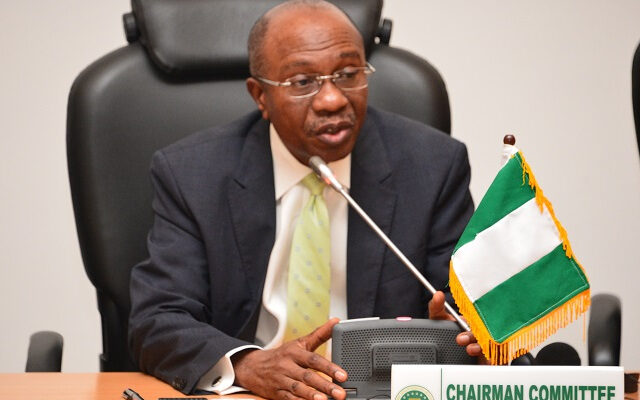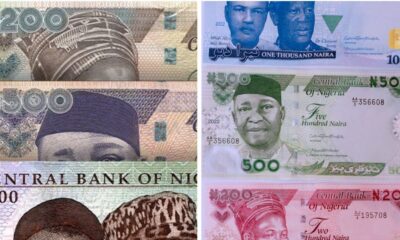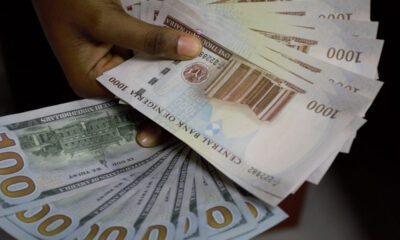NEWS
CBN releases ₦1.452T for 337 real sector projects

The Central Bank of Nigeria has revealed it had disbursed ₦1.452 trillion to 337 large real sector projects in agriculture, manufacturing, services, and mining under the Real Sector Support Facility as part of the effort to diversify the nation’s economic base.
The CBN, Director, Corporate Communications Department, Osita Nwanisobi, who disclosed this on Sunday, during “CBN Special Day” at the ongoing 33rd Enugu International Trade Fair, also noted that N948 billion was disbursed to 4,478,381 smallholder farmers under the Anchor Borrowers’ Programme.
Nwanidobi stated that the programme was yielding the desired objective as the beneficiary farmers cultivated 5.2 million hectares of farmland, creating 12.6 million direct and indirect jobs across the country.
Reeling out other interventions the apex bank had taken to revive the economy and create access to credit, he said CBN had extended the interest rate of 5% across all its intervention loans to March, 2023.
He said “the recently launched Tertiary Institutions Entrepreneurship Scheme (TIES) is an innovative financing model that will create jobs, enhance the entrepreneurial ecosystem and support economic growth and development through Agribusiness, Creative Industry, Science & Technology and Information Technology/software development.
“The broad objective of the 100 for 100 Policy on Production and Productivity (PPP) is to boost production and productivity, necessary to transform and jumpstart the productive base of the Nigerian economy.
“It is also expected that the Initiative will reverse the nation’s over-reliance on imports, by creating an ecosystem that targets and supports the right companies and projects with potentials to immediately transform Nigeria’s productive base at every 100 days.”
“The Bank has so far disbursed the sum of N29.51 billion to 31 projects, comprising 16 in manufacturing, 13 in agriculture, and 2 in healthcare sector. The RT200 FX Programme, which stands for the “Race to US$200 billion in FX Repatriation was recently announced by the CBN in consultation with the Bankers’ Committee.”
He added, “under our Targeted Credit Facility (TCF), which was meant to cushion the severe effects of Covid-19 pandemic, we have disbursed N368.79 billion to 778,000 beneficiaries comprising 648,052 households and about 130,000 SMEs.
“The Bank also recently disbursed $8.50 billion to 6 healthcare projects under the Healthcare Sector Intervention Facility (HSIF), bringing the cumulative disbursements to N116.72 billion for 124 projects, comprising 31 pharmaceuticals, 56 hospitals, and 37 other health-related services.
“As part of the effort to further support the resilience of the healthcare sector, an additional tranche of N14.7 million was disbursed to five Researchers under the Healthcare Sector Research and Development (HSRD) Grant.”
Nwanisobi, however, noted that the theme of the fair, “Opening up Nigeria Business Windows for
Competitiveness in the Emerging Global Market”, could not have come at a better time than now when the world economy is gradually opening up to businesses after the global lockdown that affected economies, leading to recessions.
While commending the leadership of the Enugu Chamber of Commerce, Industry, Mines and Agriculture for her efforts in organising this year’s Trade Fair, he said CBN was delighted that they are driving pragmatic conversations on reshaping the Nigerian economy through the Fair.
“This perfectly fits into the Bank’s drive towards diversification of the nation’s economic base and encouraging the export of non-oil commodities.
“It also underscores the CBN Governor’s clarion call on Nigerians to not only focus on the production of commodities in which they have comparative advantage but to produce, add value and export so as to grow Nigeria’s economy and create jobs.”
Earlier in address, the President of ECCIMA, Jasper Nduagwuike, commended CBN for its interventions in various sectors of the economy, adding that it had more than proved its commitment to seeing to the welfare and wellbeing of the Nigerian economy.
“The CBN can raise its shoulders in pride for the uncommon contributions it has made to not only the economy but the day to day life of the ordinary man.”
The Central Bank of Nigeria is the central bank and apex monetary authority of Nigeria established by the CBN Act of 1958 and commenced operations on July 1, 1959.



















